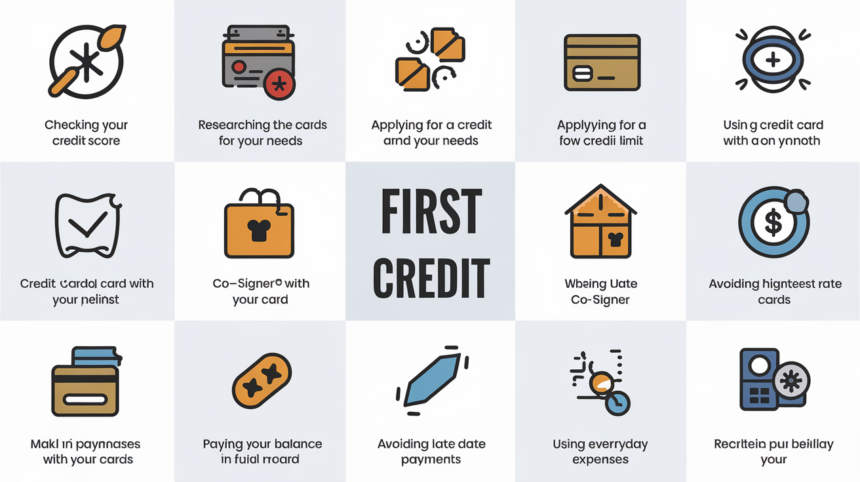Although it can be intimidating, getting your first credit card is essential in laying a solid financial basis. Along with allowing you to make purchases and enjoy different benefits, a credit card helps you create a credit history. However, knowing how to apply for a credit card for the first time can be daunting, given the many credit card choices now on the market.
We will offer you 15 great ideas in this all-around guide to raise your chances of acceptance. These guidelines will help you to be ready to negotiate the credit card application procedure and make wise judgments.
15 Strategies for Applying Successfully for Your First Credit Card
Thoroughly check your credit score.
A good credit card application depends on your knowing of your credit score. Usually resulting in better lending rates and more favorable terms, a solid credit score greatly increases your chances of approval. Use free credit score tools to have a complete awareness of your creditability. This information helps you choose a credit card wisely and find areas where you might raise your credit profile before application.
Choose the correct credit card wisely.
Exclose your financial goals and spending patterns to choose a credit card fit for your way of life. Think about things such as yearly fees, interest rates, loyalty programs, cashback incentives, and extra bonuses. Managing your money and obtaining rewards can benefit much from a credit card that fits your financial objectives. Examine several card choices to be sure they meet your wants the greatest.
Meet the eligibility criteria entirely:
Make sure you satisfy minimum income, age, residence, and credit card issuer criteria. Get the required supporting papers for your application—proof of income, identification, and address among other things. Meeting these standards shows your financial sensibility and raises your chances of acceptance. Should the issuer ask for more information, be ready to offer it.
Finish the Application Form Methodically and Correctly:
When completing the credit card application, be exact and thorough to help prevent delays or denials. Verify all specifics, including income, job history, and personal information. Inaccurate information could cause a decline in your application. Over time, thoroughly reading your application will save you time and hassle.
Create timely necessary documentation:
To speed up the credit card application procedure, compile all necessary documentation including income, address, and identity verification. Turning in thorough documentation right away shows your dedication to the application and speed. This will help the credit card issuer to see you favorably and raise your chances of quick acceptance.
Authorize a Credit Check Willingly:
Since the credit card application process calls for a credit check, agree to one. Credit checks let the issuer evaluate your creditability and ascertain whether you qualify for a credit card. Knowing the need for credit checks will enable you to decide on your financial path with knowledge.
Continually keep a Low Credit Utilisation Ratio consistent:
To raise your credit score, try to keep your credit use ratio—that which represents credit debt to credit limit—below 30%. A smaller credit use ratio denotes good credit management and raises your creditworthiness. When reviewing credit applications, lenders often weigh this percentage. Keeping a low credit use ratio shows that you can control credit.
Pay Your Bills Religiously on Time:
Developing a high credit profile depends on proving a history of regular payments. To guarantee regular on-time payments, arrange automatic payments or reminders. A good payment history shows your financial discipline and can help to improve credit scores and interest rates on your next loans.
Should necessary, think about a secured credit card:
A secured credit card can be a great tool for building credit if your credit history is limited. Secured credit cards enable you over time to build a credit history by demanding a security deposit. Using a secured credit card responsibly can help to raise credit ratings and open the possibility of graduating to an unsecured credit card down the road.
Steer clear of concurrent multiple credit card applications:
Applying for several credit cards all at once could lower your credit score. This action could cause lenders to raise questions and lower your likelihood of approval. One credit card application at a time should be your main focus; give enough time between applications to prevent damaging your credit score.
Extensively review the terms and conditions:
Extensively go over the terms and conditions of the credit card offer, including interest rates, fees, rewards, and dispute policies. Knowing the terms can assist you in deciding whether the card fits your financial objectives. Particularly pay close attention to any hidden costs or limitations that can affect your whole experience.
Immediately activate your credit card:
Once authorized, instantly activate your first credit card to begin responsible use. Delayed activation can influence the terms or advantages of the card. Turning on your card shows that you are ready to use the credit card responsibly and that you accept the credit card agreement.
Establish reasonable spending caps:
Make a budget and follow it to prevent running credit card debt. Closely examine your spending patterns to prevent overindulging. Setting reasonable spending restrictions will help you to use your credit card as a financial tool without running into debt.
Track Your Account Activity Frequently:
Review your monthly statements and online account to track your credit card activities. Right away report any illegal charges to guard your money. Regular account monitoring guarantees the excellent standing of your account and helps you find possible fraud and mistakes.
Create a strong credit record. Methodically:
To raise your credit score over time, regularly use your first credit card sensibly, pay bills on time, and keep a low credit use ratio. Creating a solid credit record calls for discipline and patience. Having a good credit history lays a strong basis for your future financial situation.
Conclusion
Applying for your first credit card can be a thrilling start toward financial freedom. Following these 15 suggestions and realizing the need for wise credit card use will help you to have better chances of acceptance and strengthen your credit record. Recall that developing credit takes time; so, be consistent in your financial practices and patience.
FAQs
Given no credit history, may I apply for my first credit card?
Although lacking a credit history can be difficult, you could want to look at applying for a secured credit card or a student credit card meant for those with minimal credit history. These choices let you build a credit history over time.
Approval for a first credit card takes what length of time?
Your financial profile and the issuer will affect how credit card approvals go. Usually, one gets a decision in a few days. Some issuers might, however, grant quick approval.
Should I get turned down for a credit card, what happens?
Should your credit card application be turned down, you can go over the issuer’s justification and attempt to raise your creditworthiness. After a few months, you can reapply; but, it’s crucial to deal with the fundamental problems generating the denial.
How might I raise my odds of having a credit card approved?
Maintaining a solid credit score, a consistent income, and accurate and complete information on your application will help you raise your chances of credit card approval. You could perhaps choose to apply for a credit card with less credit score or income criteria.
Why would one want to carry a credit card?
Credit cards provide rewards, purchase protection, fraud protection, and credit history-building capability among other things. Still, using credit cards sensibly helps one stay debt-free.





